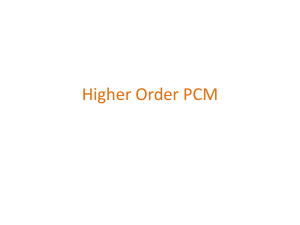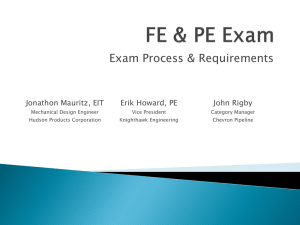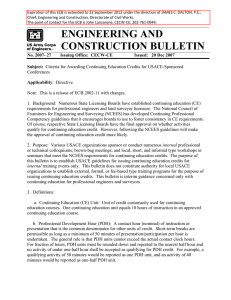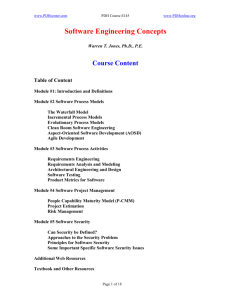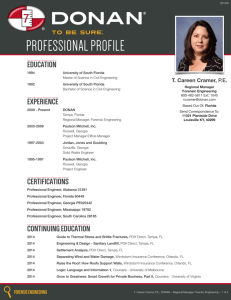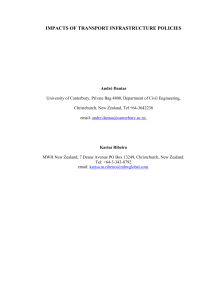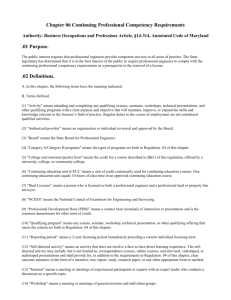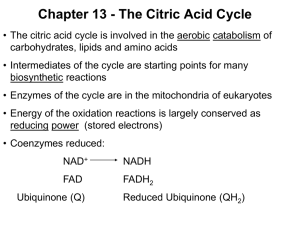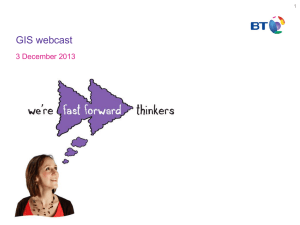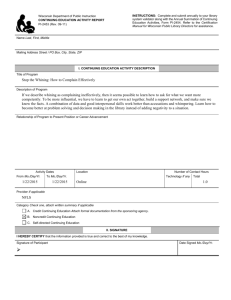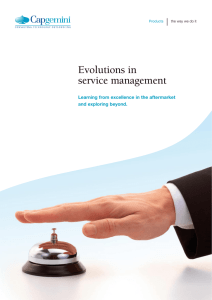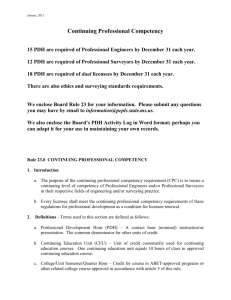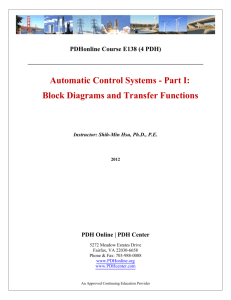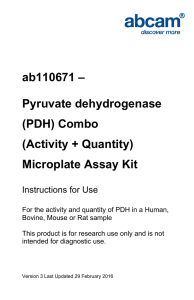Summary of the New Continuing Education Requirement
advertisement
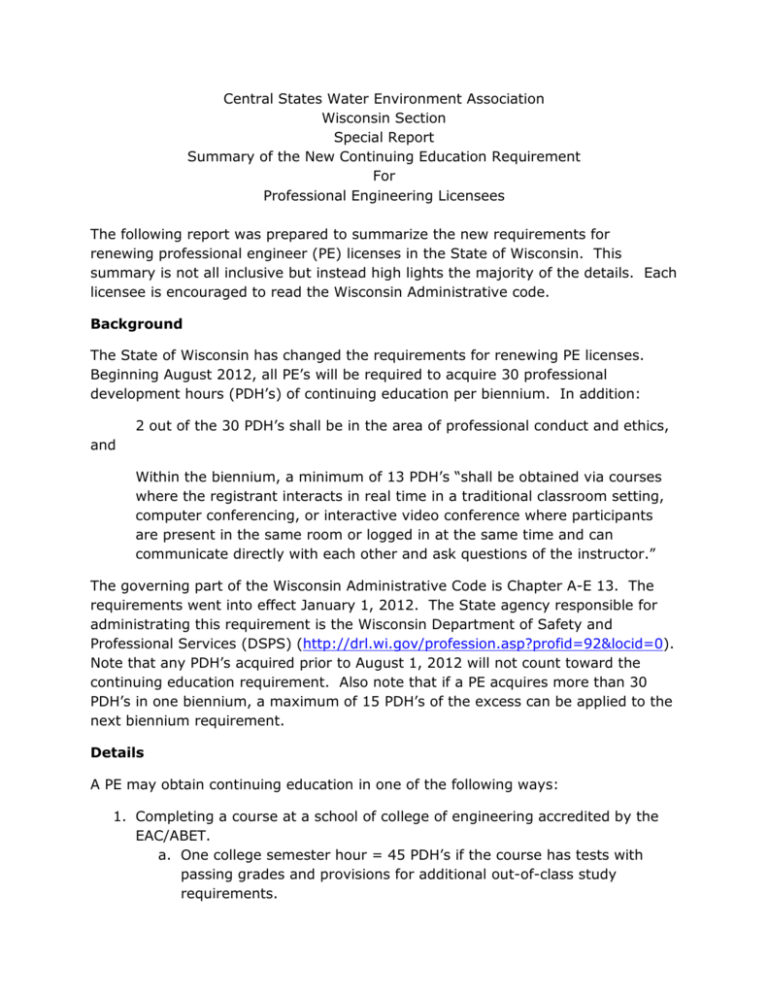
Central States Water Environment Association Wisconsin Section Special Report Summary of the New Continuing Education Requirement For Professional Engineering Licensees The following report was prepared to summarize the new requirements for renewing professional engineer (PE) licenses in the State of Wisconsin. This summary is not all inclusive but instead high lights the majority of the details. Each licensee is encouraged to read the Wisconsin Administrative code. Background The State of Wisconsin has changed the requirements for renewing PE licenses. Beginning August 2012, all PE’s will be required to acquire 30 professional development hours (PDH’s) of continuing education per biennium. In addition: 2 out of the 30 PDH’s shall be in the area of professional conduct and ethics, and Within the biennium, a minimum of 13 PDH’s “shall be obtained via courses where the registrant interacts in real time in a traditional classroom setting, computer conferencing, or interactive video conference where participants are present in the same room or logged in at the same time and can communicate directly with each other and ask questions of the instructor.” The governing part of the Wisconsin Administrative Code is Chapter A-E 13. The requirements went into effect January 1, 2012. The State agency responsible for administrating this requirement is the Wisconsin Department of Safety and Professional Services (DSPS) (http://drl.wi.gov/profession.asp?profid=92&locid=0). Note that any PDH’s acquired prior to August 1, 2012 will not count toward the continuing education requirement. Also note that if a PE acquires more than 30 PDH’s in one biennium, a maximum of 15 PDH’s of the excess can be applied to the next biennium requirement. Details A PE may obtain continuing education in one of the following ways: 1. Completing a course at a school of college of engineering accredited by the EAC/ABET. a. One college semester hour = 45 PDH’s if the course has tests with passing grades and provisions for additional out-of-class study requirements. 2. 3. 4. 5. 6. 7. b. Monitoring or auditing a course that results in not having testing with passing grades would change to one class hour = 1 PDH Completing short courses or tutorials and distance education courses offered through correspondence, DVD’s, or the internet. Presenting or attending qualifying seminars, in-house courses, workshops, or professional or technical presentations made at meetings, conventions, or conferences. Teaching or instructing – limited to the initial offering or presentation. Authoring published papers, articles, or books in the registrant’s area of professional practice that has be published in book form, circulated journal, or trade magazine. a. 5 PDH’s granted per publication b. 10 PDH’s granted if publication is peer reviewed. Actively participating in professional and technical societies a. 2 PDH’s awarded for participation as an officer or committee member. b. Maximum of 4 PDH’s per biennium may be applied to the PDH requirement. Attainment of a patent relevant to registrant’s area of professional practice. a. 10 PDH’s per patent. Caution It is the responsibility of the PE to retain all records. Records shall be kept for the 3 most recent biennia. Records required include verification of attendance in the form of completion certificates. If a continue education course awards CEU’s, the PE shall convert to PDH’s. The professional engineering section of DSPS has final authority on activities, courses, credit, PDH value for courses, and other methods of earning PDH’s. The following clarification was received from DSPS: “There will be no pre-approval of courses or programs for CE credit, so neither the A-E Joint Examining Board’s legal counsel for whom I work, nor the credentialing renewal staff of this department will be able to tell you ahead of time what courses or programs will count toward the CE requirement. Renewing PE’s will need to submit documentation of courses and programs they have completed; determinations of whether such courses or programs count toward the CE requirement will be made by renewal staff based on the documentation provided.” Kris Anderson, Paralegal Department of Safety and Professional Services Division of Board Services (608) 261-2385, Kristine1.Anderson@Wisconsin.gov Also, there is no reference in A-E 13 to “Continuing Education Credits” that are issued by DNR for attendance to various seminars, meeting, and conferences for the purposes of fulfilling water and wastewater operator requirements. An unsuccessful attempt was made to clarify if CEC’s would meet the standards for approval for PDH’s which are: 1. Instruction is in an organized method of learning contributing directly to the professional competency of the registrant and pertaining to subject matters which integrally relate to the practice of the profession. 2. Is conducted by individuals who have specialized education, training, or experience and are considered qualified concerning the subject matter. 3. Fulfills pre-established goals and objectives. 4. Provides attendance verification records in form of completion certificates or other documents supporting evidence of attendance. It would appear that in most instances where the DNR issues CEC’s, the requirements for PDH’s are also met. But all should understand that there may be some risk until DSPS clarifies this point. Chapter A-E 13 does provide the following examples of PDH qualifying activities. 1. Completing or attending courses, seminars, instruction, in-house programs, or training of engineering content related to the registrant’s practice of professional engineering. 2. Attending technical or professional society meetings when an engineering topic is presented as a principal part of the program. 3. Teaching a course for the first time or teaching a course previously taught if substantial time was spent updating material. 4. Attending webinar courses where attendance is verified and program material meets the requirements. 5. Completing correspondence courses on an engineering topic where lessons are prepared and returned for correction, grading, or both, and where testing at the end of the course is required. Suggestion It would helpful if CSWEA – Wisconsin Section would take a proactive approach and contact the professional engineering section of DSPS for the purpose of becoming an accepted provider of continuing education programs, to make sure that Central Water magazine qualifies as a trade publication, and to ensure that CSWEA is recognized as a professional society.


